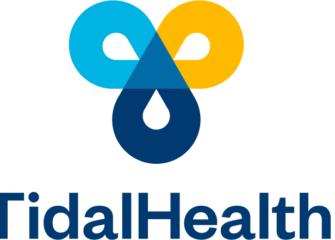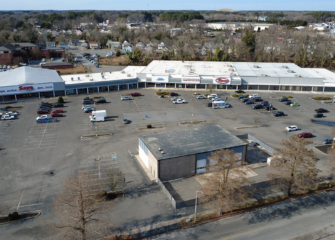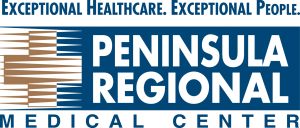
Preparing for the COVID-19 Surge
It is no longer a matter of if, but when. Healthcare leaders on the Delmarva Peninsula agree that a significant surge in the number of positive COVID-19 cases is coming, and probably very soon.
“We are anticipating a spike within the next two weeks with significant potential for respiratory failure requiring ventilation. Our plan is to be able to house over 100 ventilated patients in PRMC,” said Dr. Chris Snyder, Chief Quality Officer and Chief of the COVID-19 Response Team at Peninsula Regional Medical Center (PRMC). “The team is modifying PRMC to become a COVID hospital if necessary.”
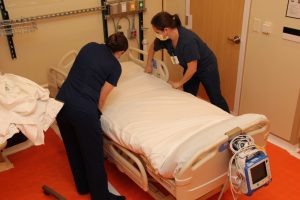
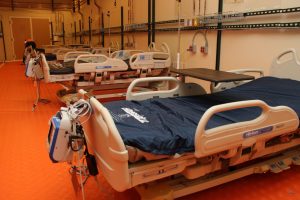
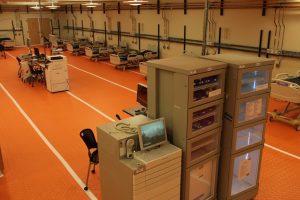
Preparation, albeit challenging, is essential as Dr. Snyder points out. At Peninsula Regional Medical Center in Salisbury, MD, the flagship and tertiary hospital of the Peninsula Regional Health System, necessity is spurring creativity in unprecedented ways.
The Medical Center has reimagined the ground floor of its Layfield Tower. What was once a bustling and spacious three-room Hallowell Conference Center and adjacent office space that could accommodate hundreds, is now a fully equipped 43-bed intensive care unit prepared for the inevitable spike. The initial concept was smooth, but adding in all of the services provided to an ICU that expands capacity for the entire health system was a challenge, especially negative airflow.
“Negative-pressure rooms are ventilated in a way that allow air to flow into the room, but not out of it, to contain all airborne contaminants,” added Tom Anderson, PRMC’s Senior Director of Property Management and Construction. “However, with everyone working as a team, all of the options were vetted and the solution is a converted space to an ICU.”
The process took 18 straight days with teams from AIM, Rommel Electric, Whiting Turner, Zimmer Mechanical, Quality Sheet Metal, K.B. Coldiron, Clean Edge, Kitchen Concepts, Modern Controls and Chesapeake Balancing working in cooperation with PRMC to transform the 20,000 square feet.
The result is a COVID ICU where one was never imagined, but completely functional with all medical gases (oxygen, vacuum and medical air), emergency power, nursing stations, printers, phones, EPIC medical record charting and other peripheral equipment. The unit also features clean and dirty rooms to put on and take off protective gear. ICU staff, once donned with the necessary protective equipment for treating COVID-19 patients,
can also move from room to room without leaving what clinicians call the “dirty space” or the actual patient treatment area of the Hallowell COVID ICU.
The unit can begin housing patients in an instant to complement the Medical Center’s traditional ICU, where PRMC plans to house critically ill non-COVID patients. It also joins an 8-bed negative-pressure COVID ICU previously established in the former pediatrics space off the Emergency Department, and a COVID treatment unit on the fifth floor of the Layfield Tower.
“We have put all of our local data into a predictive model that was developed at Northeastern University. This model includes our actual numbers on local surge capacity, both regular hospital beds and critical care beds, as well as our available material resources. Importantly, it incorporates our real COVID experience in the region so far,” added Mark Edney, MD, Chief of the Medical Staff at PRMC. “Given our current state of resources—space, material, and human—our modeling suggests that our local surge over the next few weeks will tax our system but not exceed our critical capacities.”
Converting an area into three open-space patient care units, with a capacity to care for 43 patients, including all the necessary equipment such as ventilators, monitors, IV pumps, etc., and all in a negative pressure environment, has presented more than a few challenges.
“It has required us to think in ways we have never thought. Throughout the entire process the attitude of all involved has been to ‘make it happen,’” said Tom Jones, RN, MSN, CCRN, Director of Critical Care Services at PRMC. “From facilities to purchasing to infection prevention to pharmacy to information systems, all have been working to help our clinical staff have what they need to care for our COVID-19 patients.”
Looking beyond COVID-19, the PRMC team has a plan already in place to remove the beds, “terminally clean” the area, cover the unit so it can easily be re-transformed if ever needed again, and return the space to its intended use.
PRMC reminds everyone to continue practicing hand hygiene and to wash your hands vigorously and regularly with soap and water, avoid touching your face, practice social distancing and stay home as ordered by the Governor. If you have COVID-19 questions, please call our COVID-19 hotline at 410-912-6889.

